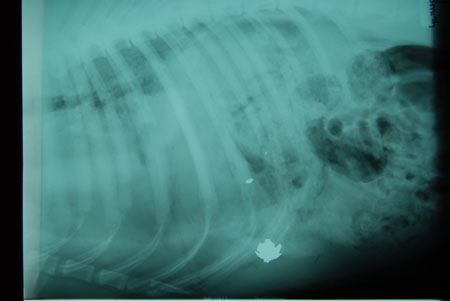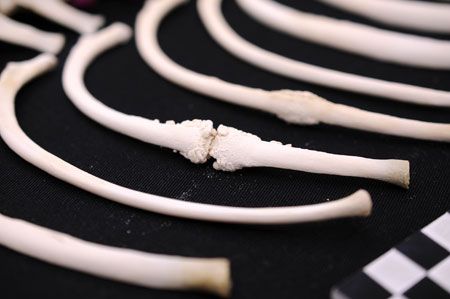Study will investigate suspected abuse cases
Massachusetts veterinarian aims to elevate awareness of animal harm.
A new research study that began this summer is looking into suspected cases of animal abuse in the Boston, Massachusetts, area from a veterinary forensics standpoint.

Dr. Smith-BlackmoreCrimes Against Canines is the project of Martha Smith-Blackmore, DVM, president of the newly formed Forensic Veterinary Investigations, a coalition of experts dedicated to investigating animal cruelty. Supported by a grant from the Stanton Foundation, Smith-Blackmore will spend the next year investigating suspicious canine injuries and deaths with the expectation that her findings will contribute to animal welfare in the region.
“I found myself thinking about my legacy and how I could do things that would have a lifespan beyond my lifetime. Most importantly, I was frustrated by the current animal protection paradigm and wanted to help create change,” she says.
Smith-Blackmore hypothesizes that a lack of knowledge and services at the ground level prevents animal abuse cases from being identified and elevated to the criminal justice system. Those that do come to light are just the tip of the iceberg, she suspects, and if expert veterinary evaluation were more widely available, more widespread awareness of animal abuse would develop-along with prosecution and potential solutions.
To dig into this theory, Smith-Blackmore will provide no-cost live-dog exams or necropsies to any agency that requests them in Massachusetts for the next year. She will also be collaborating with the Massachusetts chief medical examiner's office, Cummings School of Veterinary Medicine at Tufts University, and the forensics programs at Boston University School of Medicine.
Smith-Blackmore hopes to help the public understand how pervasive animal abuse is and to encourage them to advocate for their communities to be equipped and trained to investigate it. “Humane societies have historically taken on the role of investigating animal cruelty, but they're underresourced as well,” she says. “Being a felony crime, every police department has a responsibility to take on these cases.”
Smith-Blackmore became interested in veterinary forensics as a child after witnessing animal abuse and feeling powerless to do anything about it. An interest in scientific inquiry and a hate of injustice also influenced her path.
Prior to her involvement with Forensic Veterinary Investigations, she worked in shelter medicine, where she found it highly rewarding to assist law enforcement officers with their animal cruelty investigations. As her career trajectory took her away from caring for animals and into shelter administration, she found herself wishing she were contributing to animal welfare in a more concrete way.
That's where Forensic Veterinary Investigations and Crimes Against Canines came into play. “I decided to find a way to focus on work that would be more impactful for protecting animals and people,” Smith-Blackmore says.

A radiograph of a 40-caliber bullet in a Mastiff.
A forensic veterinary investigation can include a wide variety of tasks, she says-visiting a scene with police officers, performing a clinical exam or necropsy, reviewing a veterinary record, or studying photographs for signs of abuse. A veterinarian investigating a case might also conduct specialized tests or consult forensic scientists from other fields like entomology or toxicology. He or she might collect, package and preserve trace evidence such as fibers or DNA and then track it through the chain of custody, Smith-Blackmore says.
She particularly wants her fellow veterinarians to be aware that every exam is potentially a forensic exam. “Forensic means ‘before the court,' so any case where a disgruntled owner wants to claim malpractice, or in any contentious divorce where there is a dispute over animal ownership, the medical record could end up in court,” she says.
One case specifically affected Smith-Blackmore deeply, driving her desire to create change in the animal welfare field. In the case of “Puppy Doe,” a dog was found unable to walk in the woods next to a park with no collar, tag or other identifying information. She was taken to a local shelter and then to a veterinary hospital.
Even without diagnostic imaging it was obvious that the dog had been badly injured, but she didn't present like a typical hit-by-car patient. The animal control officer didn't have a budget for diagnostics or treatment, so Puppy Doe was humanely euthanized. The veterinarian realized the dog's injuries were not consistent with accidental injury, so she reported the case to local police. Smith-Blackmore performed a necropsy and found profound injuries that were anthrogenic in origin. She declined to provide more details since the case is still being investigated.
“This case was just the most shocking case I encountered. Before her, there were dozens of dogs found dead: floating in harbors, submerged in crates in the river, wrapped in tablecloths on public park land or the side of the road, dumped in garbage bags on the side of the river, buried in shallow graves near the department of public works,” she says. “I examined all of these dogs.”
Some were shot, Smith-Blackmore continues. Some were starved. Some had been hit by a car and died without receiving veterinary care. Some were dogfighting victims. “But none of them were investigated by local police with the vigor that the Puppy Doe case was,” she says.

A broken bone from an animal abuse victim.
Partly because of cases such as Puppy Doe's driving awareness, response to Smith-Blackmore's work has been positive, with people highly interested in learning more. “Most people are surprised to learn that abandonment of dead dogs is as pervasive as it is,” she says. They also don't realize that most cities are severely short of resources for investigating cases of harmed animals-they lack both the budget and training necessary.
This is partly because the field of veterinary forensics is still relatively new and growing, Smith-Blackmore says. In some cases a veterinary-specific forensic investigator may not be available in the area. If so, Smith-Blackmore suggests that veterinarians contact a local shelter colleague who may have experience or training in animal abuse investigation. Additional resources can be found on vetinvestigator.com.
Veterinarians and other professionals in Massachusetts who are interested in requesting a forensic examination through the Crimes Against Canines study can submit an inquiry through the “Contact us” form on vetinvestigator.com or call Smith-Blackmore directly. The scope of her research includes cases submitted by veterinarians, police departments, animal control officers, prosecutors and city officials.
FDA approves oral drug for broad canine protection against parasites
October 7th 2024Elanco's lotilaner, moxidectin, praziquantel, and pyrantel chewable tablets (Credelio Quattro) provide a single monthly dose for protection against fleas, ticks, heartworms, roundworms, hookworms, and 3 species of tapeworm.
Read More